
Politics
Cook Communication Books
Meet Our Authors
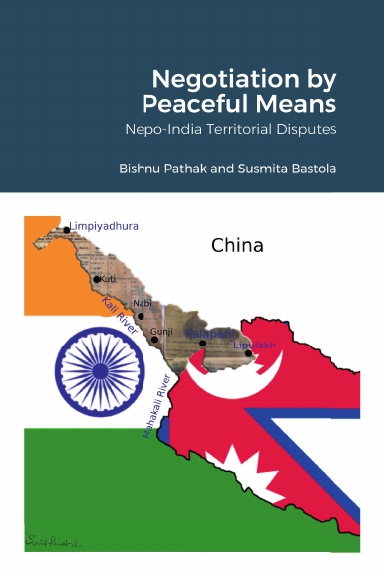
Negotiation by Peaceful Means: Nepo-India Territorial Disputes,, by Bishnu Pathak, Ph.D. Susmita Bastola, Ph.D. candidate
Print: $15.00
BISHNU PATHAK and SUSMITA BASTOLA - This book offers an exclusive dialogic pyramid model to resolve or transform the Nepo-India territorial disputes. Nepal and India are not only territorially close, but they are enjoying excellent connections of history, culture, religion, and tradition engagement from people to people. Therefore, dialogue at the bottom level can equally serve as a peaceful means to solve territorial disputes. The bottom-up dialogue approach among the civilians can transform anti-national sentiments and media jingoism. Ultimately, both countries love the cultural ties-up by maintaining peace, coexistence, and harmony.
There has been a self-admiration that India is the world’s largest democratic country. But the question is, why does India not sit for a dialogue with Nepal to transform the territorial disputes by peaceful means? Both nations should open the channels for informal-indirect and formal-direct dialogue and participation among state-to-state and non-state to non-state actors, grassroots people, civil society, and religious leaders. Dialogue begets the negotiation to transform the disputes by peaceful means.
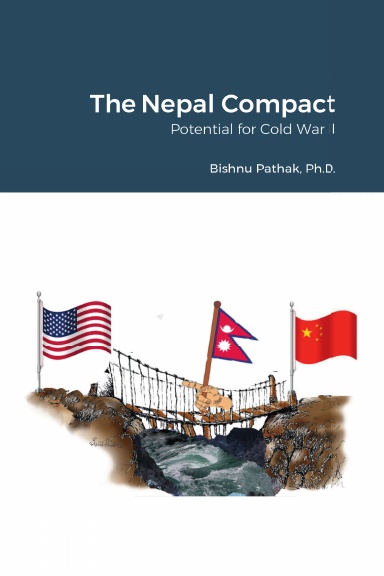
The Nepal Compact,, by Bishnu Pathak, Ph.D.
Print: $15.00
BISHNU PATHAK - Nepal Compact is an integral part of the Millennium Challenge Corporation (MCC). The MCC is a grant agency established by the United States (US) to reduce global poverty. The objectives of the study are to: examine the cause and patterns; identify the grant areas, and evaluate controversial issues of the MCC. The state-of-the-art paper is prepared based upon literature review, archival research, and lesson-learned centric approach from yesterday, studies the axiomatic truth of the Nepal Compact today, and interprets how potential Cold War-II initiates from the geostrategic land Nepal tomorrow. The study method led to snowball techniques. The ratification of the Nepal Compact formally ended a chaotic five-year-long saga. But, its politico-diplomatic controversy spread in all tiers and professions even at the grassroots level. Large sections of Nepali people protest the assistance of the US and India in Nepal. There are many opportunities and a few are doubtful dilemmas in the MCC.
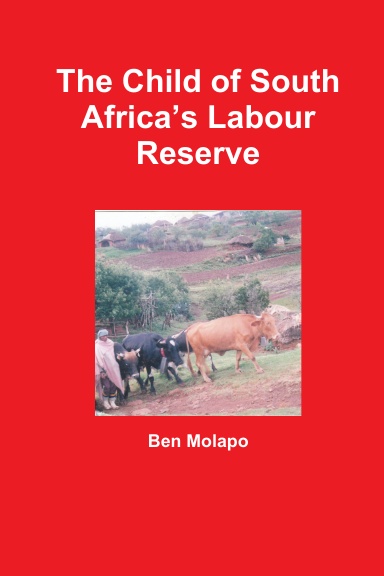
The Child of South Africa’s Labour Reserve,, by Ben Molapo (book)
Print: $17.00
BEN MOLAPO - Written as a record of his life, Makotoko Bernard Molapo's book recounts his touchy upbringing and the oral stories of his grandfather Mohatonyane. He records the story of a community and of a nation that has, since the discovery of diamonds in 1870s in Kimberley and gold in Witwatersrand area been systematically transformed into a labour reserve for the South African mining industry. Bernard laments this as a history of the cost of human lives that the industry had to incur to operationally sustain itself. The blacks accounted for most of the deaths, watering the wealth of the captains of the SA mining industry for generations. Unlike the holocaust story where there was reparation for wrongs committed against the human race, people from SA labour reserve areas just take this as a defining feature of their own community survival. The subordination of the poor to the interests of the super rich has received dead silence.
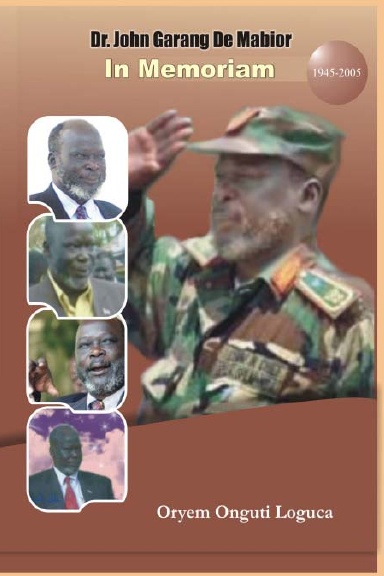
Dr. John Garang De Mabior: In Memoriam (book), By Oryem Onguti Loguca
Print: $9.35
ORYEM ONGUTI LOGUCA. The memories of Dr. John Garang will be immortalized by anyone who had known what he fought for in his lifetime; culminating in a helicopter crash on 30th July 2005. That crash, which he never survived, took his physical flesh. Humanity will continue to drink his vision and legacy at a high rate, leaving those still thirsty to know him well, being stranded at the shelves of knowledge to further seek to know, John Garang, the human being. A sheer fact of his dedication to his cause and quest of his people who had suffered for generations shouldn’t be left to rot. It should be documented for posterity. Foreword by Steven Wöndu, Sudanese Ambassador to Japan

The Politics of Managing the Boss (book), By S.M. Zakir Hussain
Print: $16.04
By S.M. ZAKIR HUSSAIN. Managing the Boss is like managing one’s wife: one must give more than what one wants to get, but ironically, the wife afterwards thinks she has gotten less than she gave. “Then why the hell do I ever need to manage him?” you might be asking the author. Well, it is because he wants to be managed.
all titles

 Three Cups of Tea: One Man's Mission to Promote Peace . . . One School at a Time, by Greg Mortenson, David O. Relin (Viking, 2006) more
Three Cups of Tea: One Man's Mission to Promote Peace . . . One School at a Time, by Greg Mortenson, David O. Relin (Viking, 2006) more
 Black Belt Patriotism - How to Reawaken America, by Chuck Norris (Viking, 2006) more
Black Belt Patriotism - How to Reawaken America, by Chuck Norris (Viking, 2006) more
 Preventing War in the Nuclear Age, by Dr. Dietrich Fisher (Rowman & Allanheld) more
Preventing War in the Nuclear Age, by Dr. Dietrich Fisher (Rowman & Allanheld) more
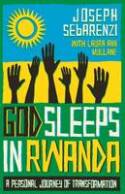 God Sleeps in Rwanda: A Journey of Transformation, byJoseph Sebarenzi (Oneworld Publications , 2010) more
God Sleeps in Rwanda: A Journey of Transformation, byJoseph Sebarenzi (Oneworld Publications , 2010) more
 50 Years, 100 Peace & Conflict Perspectives, byJohan Galtungi (Xlibris, 2008) more
50 Years, 100 Peace & Conflict Perspectives, byJohan Galtungi (Xlibris, 2008) more
 Dispatches from the Edge, by Anderson Cooper (HarperCollins, 2006) more
Dispatches from the Edge, by Anderson Cooper (HarperCollins, 2006) more
 Dark through the Delta, by Uche Peter Umez, eDu-eDy Publications 2004) more
Dark through the Delta, by Uche Peter Umez, eDu-eDy Publications 2004) more
 Gandhi Today: The Story of Mahatma Gandhi's Successors, byMark Shepard Seven Locks Press, 1987) more
Gandhi Today: The Story of Mahatma Gandhi's Successors, byMark Shepard Seven Locks Press, 1987) more
 Burma Boy, by Biyi Bandele (Jonathan Cape) Stories of Brit colonialization Novel more
Burma Boy, by Biyi Bandele (Jonathan Cape) Stories of Brit colonialization Novel more
back to top
 Three Cups of Tea: One Man's Mission to Promote Peace . . . One School at a Time, by Greg Mortenson, David O. Relin (Viking, 2006) more
Three Cups of Tea: One Man's Mission to Promote Peace . . . One School at a Time, by Greg Mortenson, David O. Relin (Viking, 2006) more Black Belt Patriotism - How to Reawaken America, by Chuck Norris (Viking, 2006) more
Black Belt Patriotism - How to Reawaken America, by Chuck Norris (Viking, 2006) more Preventing War in the Nuclear Age, by Dr. Dietrich Fisher (Rowman & Allanheld) more
Preventing War in the Nuclear Age, by Dr. Dietrich Fisher (Rowman & Allanheld) more God Sleeps in Rwanda: A Journey of Transformation, byJoseph Sebarenzi (Oneworld Publications , 2010) more
God Sleeps in Rwanda: A Journey of Transformation, byJoseph Sebarenzi (Oneworld Publications , 2010) more 50 Years, 100 Peace & Conflict Perspectives, byJohan Galtungi (Xlibris, 2008) more
50 Years, 100 Peace & Conflict Perspectives, byJohan Galtungi (Xlibris, 2008) more Dispatches from the Edge, by Anderson Cooper (HarperCollins, 2006) more
Dispatches from the Edge, by Anderson Cooper (HarperCollins, 2006) more Dark through the Delta, by Uche Peter Umez, eDu-eDy Publications 2004) more
Dark through the Delta, by Uche Peter Umez, eDu-eDy Publications 2004) more Gandhi Today: The Story of Mahatma Gandhi's Successors, byMark Shepard Seven Locks Press, 1987) more
Gandhi Today: The Story of Mahatma Gandhi's Successors, byMark Shepard Seven Locks Press, 1987) more Burma Boy, by Biyi Bandele (Jonathan Cape) Stories of Brit colonialization Novel more
Burma Boy, by Biyi Bandele (Jonathan Cape) Stories of Brit colonialization Novel more




